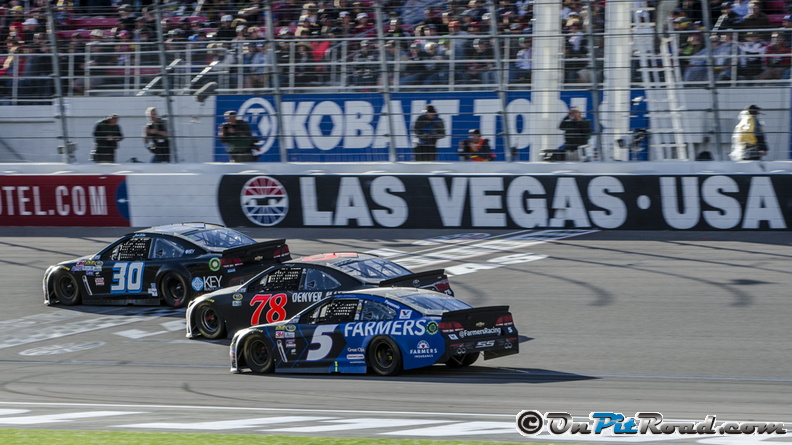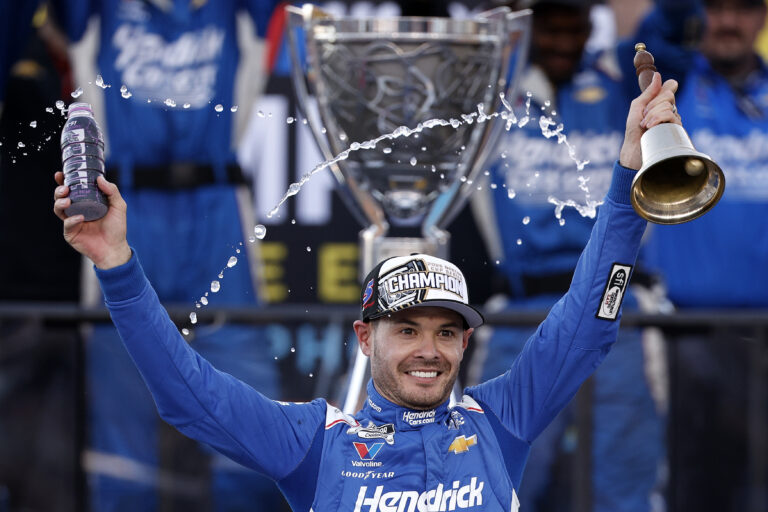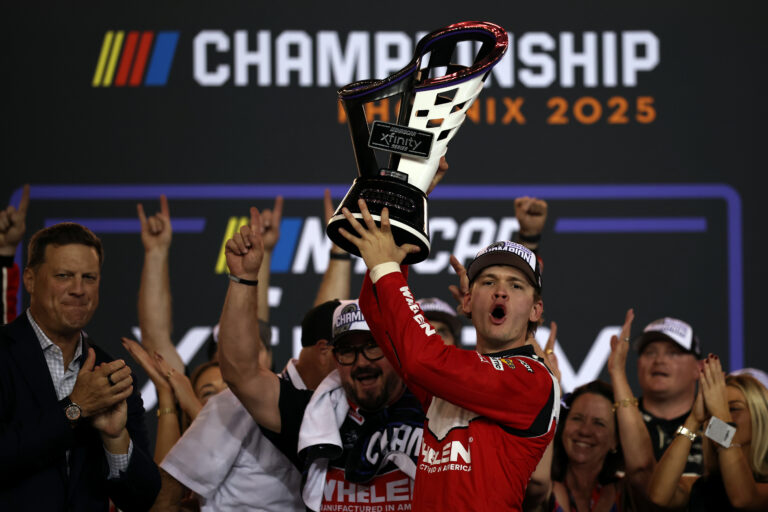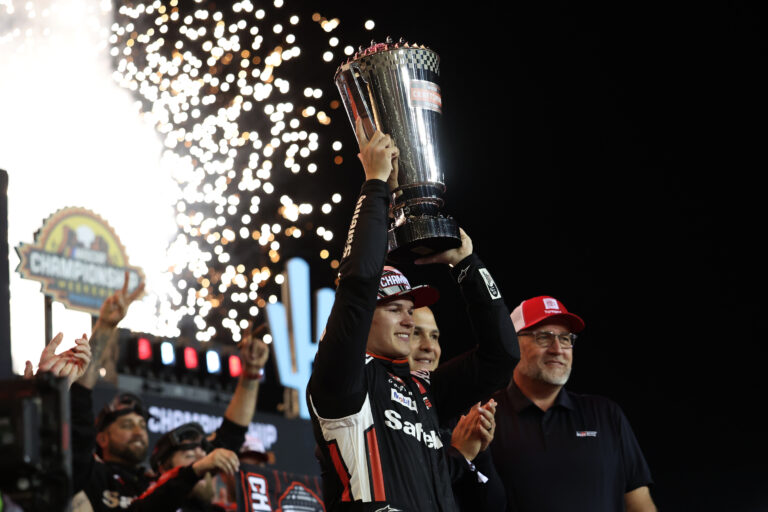
Photo Credit: Justin McFarland/OnPitRoad.com
This week, it was announced Las Vegas Motor Speedway (LVMS) would have a second date on the Monster Energy Cup Series schedule. Speedway Motorsports Inc (SMI), which owns LVMS, made the “business” decision to move a date from another track, New Hampshire Motor Speedway (NHMS), to accomplish this change. Do these good “business” decisions ultimately hurt the sport?
Reports indicate the primary driver for this decision was a seven year, $2.5M annual investment from the Las Vegas Convention and Visitors Authority. Both dates at NHMS, meanwhile, were unsponsored for the 2017 season and, evidently, no high potential prospects “in the funnel”. It does not take a CPA to figure out the significant difference between the two scenarios.
When changes such as these occur in the sport, it immediately draws complaints from fans. Terms such as tradition and loyalty are often used to show one’s displeasure with the changes. There was a significant amount of this when Rockingham and Darlington lost dates. It was almost sacrilegious in the eyes of many fans to think NASCAR would allow race dates to be taken away from these legendary tracks.
Bruton Smith, majority owner of SMI, is often demonized for “ruining the sport” just to make more money. Fans often opine that money has destroyed NASCAR. It is true that money influences which drivers are hired by teams, the race schedule, the television schedule and much more in NASCAR and corporate influence plays a factor in virtually every aspect of the sport today. But, has it truly “ruined” NASCAR? Where would the sport of stock car racing be without the influence of money?
In the “good ole days”, fans had very little coverage of NASCAR on media venues. We all had to gather around the radio and listen to the MRN broadcast to hear the race live. If we missed it, we had to hope our local news told us who won, and if it did not, we had to wait for the newspaper to hit the stands the next day. If there was no money being invested in the sport television networks would not cover the sport, at least not nearly at the level they do today. We have the luxury of watching virtually every practice lap, every qualifying lap and every race lap of the entire season.
During the week, there are multiple magazine shows that discuss NASCAR news, interview personalities, and provide technical information. There are motorsports news websites and social media sites on the internet that provide fans with almost instantaneous news updates from the track.
In the “good ole days” we had to wait until our weekly copy of Grand National Scene hit our mailbox to get all the news. Money from corporate sponsorship is what makes all this possible.
The business decision made by SMI this week was driven by its fiduciary responsibility to its shareholders. It was not driven by the desires of the fans, which track provides the best racing, or the sentiment of tradition. This is the aspect that seems to rile fans up.
If SMI did not make these type of decisions, eventually, the shareholders would pull out, the money would dry up, and SMI may cease to exist. Ponder for a moment what our sport would look like without SMI. We would not have the fantastic fan friendly improvements we enjoy.
Tracks like Charlotte, Bristol, Kentucky, New Hampshire, and Atlanta have all had tremendous financial investments that made the race day experience much more enjoyable, more interactive and more fan friendly. Would fans really prefer concrete bleachers, no massive video screens, no high-quality sound systems and no pre-race or post-race entertainment shows? And, don’t forget the traffic infrastructure upgrades and fan amenities outside the tracks. Do you think the local city or county commissioners would spend millions of dollars to make fan’s race day experiences more enjoyable? Not likely.
So, before we complain about how money has ruined the sport and good “business” decisions are bad for the sport, think about the benefits we enjoy due to those decisions.
If any fan wants to make sure their favorite track does not lose a date, there is a very simple solution…. attend the races. Make sure friends and family attend the races. Make sure tickets are hard to get because so many fans want to go to the races. (Remember the glory days of night racing at Bristol?) If a track sells out every race and is forced to once again add grandstands instead of taking them away, that track will not lose its dates. It is that simple.
Las Vegas tourism authorities obviously feel it is beneficial to have a second date at LVMS to attract more tourists. More tourists are good for local businesses and local economies. Did New Hampshire race fans lobby local companies or tourism organizations to invest money at NHMS and keep two race dates there?
Probably not, because money ruins the sport… right?
**The opinions expressed on this site are not necessarily those of the publisher, management or staff. All comments other than website related problems need to be directed to the author. (c)OnPitRoad.com. **





NASCAR should run ALL as stand alone single day events. .The stands would be full every week. More racetracks in the North, not less.If I wanted to watch TV at a racetrack,I’d bring my own and stream it. If I want to see Tom Petty play music,I’ll buy a ticket to see him.
Hi Tim, thanks for reading. It sounds as if you are a traditionalist. I am as well. I actually personally agree with most of your comment. It would not personally bother me to visit tracks with no large video screens and I have never personally attended a concert on a race weekend other than when working there as a member of the media. I do disagree, however, with your point about the stands being full on standalone weekends. The attendance at standalone Xfinity and Truck series races has been abysmal. Standalone Cup weekends are doing ok, but not great. So, I do not think that would help.
The major issue is that fans like you and I (traditionalist) are becoming a rare breed. Today’s fan wants non-stop entertainment and as many amenities they can get. So, without the influx of money and these business decisions that create race day experiences for the ever evolving race fan, you and I would lose much of the access to the sport we love. We traditionalists must be willing to compromise some of these traditions to keep the sport moving forward and keep people watching. The reason is there are too many of us traditionalist that simply are not going to the race track. If WE were packing the stands and everything was booming, there would be no need to change in the first place.